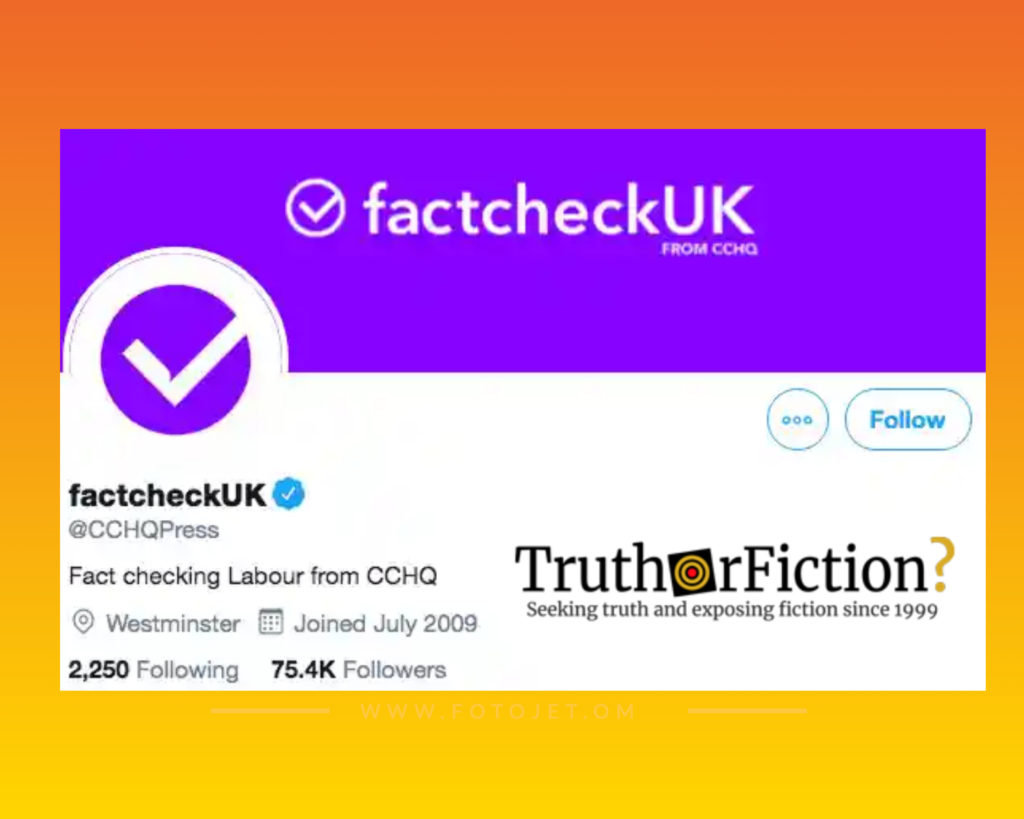As a December 12 2019 general election looms over the UK and the rhetoric around its third election since 2015 grows ever louder, distractions and political stunts have hit a fever pitch, injecting misinformation and outright disinformation into its public discourse.
Some of this is a natural side effect of a hastily called election, but much of it is deliberate. So it was with the Conservative Party’s communications account on Twitter, @CCHQPress:
During Tuesday night’s debate between Boris Johnson and Jeremy Corbyn, the Conservative party renamed their main media account as “factcheckUK”, changed its logo to hide its political origins, and used it to push pro-Conservative material to the public.
Although the Twitter handle remained as @CCHQPress, all other branding was changed to resemble an independent factchecking outlet, meaning it may not have been immediately apparent to an individual who saw the account’s tweets in their feed that it was a product of Conservative party HQ.
On clicking through, they would have seen a disclaimer that factcheckUK was “fact checking Labour from CCHQ”, ” the acronym for Conservative campaign headquarters.
The obvious problem here is that many people did not click through to the disclaimer, instead accepting the “fact checks” at face value. To complicate the issue, the Conservative Party made the change to push disinformation during a televised election debate between Tories and the Labour Party:
The change was made at the beginning of a televised debate between Boris Johnson and Jeremy Corbyn. The account was used throughout the debate to attack Mr Corbyn and his party and endorse Mr Johnson and the Conservatives, occasionally using the language of fact-checking but often simply sharing straightforward political posts.
[…]
By using an existing account, the Tories were able to borrow the authority that the CCHQ Press Twitter page had accrued, even with the new and unrecognisable name. That meant that many of the things that might indicate a fake account was being used – such as few followers or no verification tick – were not present, and the account did appear authentic.
Chief among those are the small tick that appears next to a verified user’s name on the account. Twitter’s verification scheme is intended to allow it to identify accounts that have been checked and confirmed to belong to the person they claim that they do – which the Tories were able to exploit to give them the checkmark that suggested they had been verified as factcheckers, when in fact they had been verified when they were explicitly and openly the press account.
Actual fact-checking sites weighed in on the matter:
It is inappropriate and misleading for the Conservative press office to rename their twitter account ‘factcheckUK’ during this debate. Please do not mistake it for an independent fact checking service such as @FullFact, @FactCheck or @FactCheckNI
— Full Fact (@FullFact) November 19, 2019
There has been little comment from Twitter, although impersonation is strictly prohibited, at least according to its posted rules and guidelines:
Impersonation is a violation of the Twitter Rules. Twitter accounts that pose as another person, brand, or organization in a confusing or deceptive manner may be permanently suspended under Twitter’s impersonation policy.
What is not an impersonation policy violation?
Accounts with similar usernames or that are similar in appearance (e.g., the same profile image) are not automatically in violation of the impersonation policy. In order to violate our impersonation policy, the account must portray another entity in a misleading or deceptive manner.
Accounts with similar usernames or that are similar in appearance (e.g., the same profile image) are not automatically in violation of the impersonation policy. In order to violate our impersonation policy, the account must portray another entity in a misleading or deceptive manner.
Social media has come under heavy criticism since 2016 for its role in enabling and spreading disinformation and propaganda, particularly around contested elections. In late October 2019, Twitter’s chief executive officer Jack Dorsey announced that he would no longer allow political advertisements to run on the platform, setting himself apart from Facebook, which had previously announced that it had no intention of stopping (or fact-checking) political ads.
We have asked Twitter for comment but have not yet heard back.
- General election 2019: A really simple guide
- Tories pretend to be factchecking service during leaders' debate
- FactcheckUK: How Twitter’s rules let Tories convincingly rebrand as fact checkers
- Social Media, Disinformation and Electoral Integrity: IFES Working Paper
- At Least 70 Countries Have Had Disinformation Campaigns, Study Finds
- Twitter announces ban on all political ads
- Facebook refuses to fact-check political ads, and it's infuriating employees and lawmakers. Here's why the issue has become Facebook's latest major controversy.
- UK set for ‘most unpredictable election’ in decades, study finds

